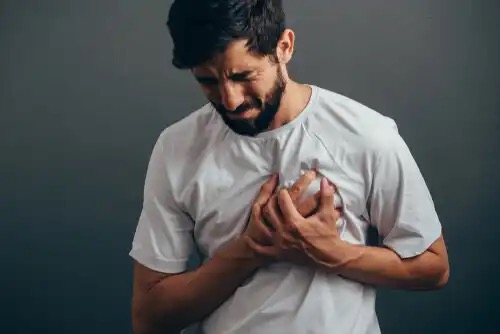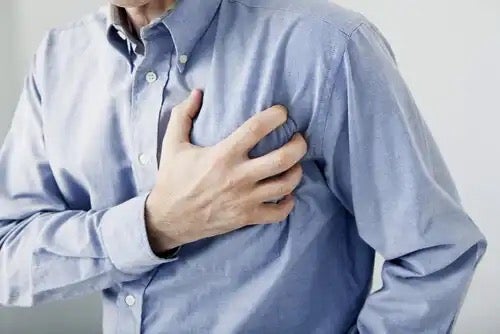Feeling sudden and intense chest pain is quite common. Nevertheless, no matter how frequently it might happen, it always causes a certain amount of concern. Is it a heart attack or angina? These are the most common questions to ask when you experience sudden chest pain.
Firstly, you should remember that chest pain is often a common symptom of anxiety. This kind of pain usually lasts between 10 and 15 minutes and disappears on its own. However, it’s always best to rule out any other possible ailments or cardiac changes. For this reason, you should consult your doctor.
There are multiple causes of chest pain. They include digestive problems and muscle and bone conditions such as costochondritis, a disease of the cartilage of the ribs. For this reason, it’s always best to get a diagnosis in order to rule out any other possible conditions.
Sometimes, the doctor will rule out physical and organic problems and reveal anxiety as the cause. However, some people find this hard to accept. This is because they find it difficult to understand that such intense pain has a mental and not a physical trigger.
Chest pain is a symptom of anxiety
Studies conducted by Boston University and Harvard Medical School reveal some interesting information. The study, led by Dr. Jeff H. Human, suggests that one in four people who go to the emergency room thinking they’re having a heart attack are actually having a panic attack. In fact, pain in the chest is one of the most common symptoms of a panic attack. This data is significant as it indicates the huge impact that anxiety disorders have on the population.
Chest pain associated with anxiety doesn’t last longer than between five to ten minutes. It’s a brief experience. However, it’s also an extremely intense one, particularly when accompanied by the other symptoms of a panic attack.
Why is pain felt in the chest?
Generally, the pain appears in the following ways:
- It happens for no apparent reason. Sometimes, it occurs in the most normal of situations like when you’re eating, talking on the phone, or watching TV.
- The pain is intense. It feels like twinges in the heart that keep you from breathing normally.
- The experience is brief and usually disappears on its own.
The pain is due to one of two reasons:
- Muscle tension. The heart is a muscle. If you’ve been anxious for days or weeks, this emotion accumulates and impregnates itself in your body. Then, when you least expect it (particularly when you’re relaxed) the muscles react in the form of pain in your chest.
- Breathing and anxiety disorders. When you’re anxious, your breathing changes. It becomes faster and there are changes to your intercostal muscles. This manifests itself in the form of chest pain. Furthermore, the change in your breathing generates an excess of gases that also present themselves as a stabbing pain.

Other causes
As we mentioned above, the most important thing to do when you suffer chest pain is to go to the doctor. However, anxiety is a psychological disorder that doesn’t show up in blood tests or X-rays. Therefore, it’ll only be diagnosed when the doctor has ruled out all other eventualities.
There are other physical and organic causes.
Heart disease
When a person has heart disease (heart attack or angina, etc.), they usually experience the following symptoms:
- Pressure, burning, or tightness in the chest.
- Oppressive pain that reaches the back, neck, jaw, shoulders, and one or both arms.
- The pain doesn’t go away. In fact, it becomes more intense, to the point that the person may lose consciousness.
- A sensation of drowning and shortness of breath.
- Cold sweats.
- Dizziness.
- Nausea or vomiting.
Digestive problems
Chest pain can also be due to digestive disorders. The most common are:
- Heartburn.
- Disorders and diseases of the esophagus.
- Problems in the gall bladder or pancreas (inflammation, gallstones, etc.).

Muscle and bone causes
- Costochondritis. A disease located in the cartilage that joins the ribs to the sternum. It becomes inflamed and causes pain.
- Illnesses like fibromyalgia.
Lung problems
The most common lung problems that cause chest pain are the following:
- Pulmonary embolism.
- Pleuritis.
- A collapsed lung.
- Pulmonary hypertension.
As we’ve seen, chest pain can have multiple origins. However, in most cases, it’s due to anxiety. If you find yourself suffering from chest pain, make sure to get diagnosed as soon as possible. If you discover that it’s due to anxiety, you can learn to manage it and prevent it from negatively affecting your quality of life.
The post Is Chest Pain Always Something to Worry About? appeared first on Exploring your mind.


















Comments